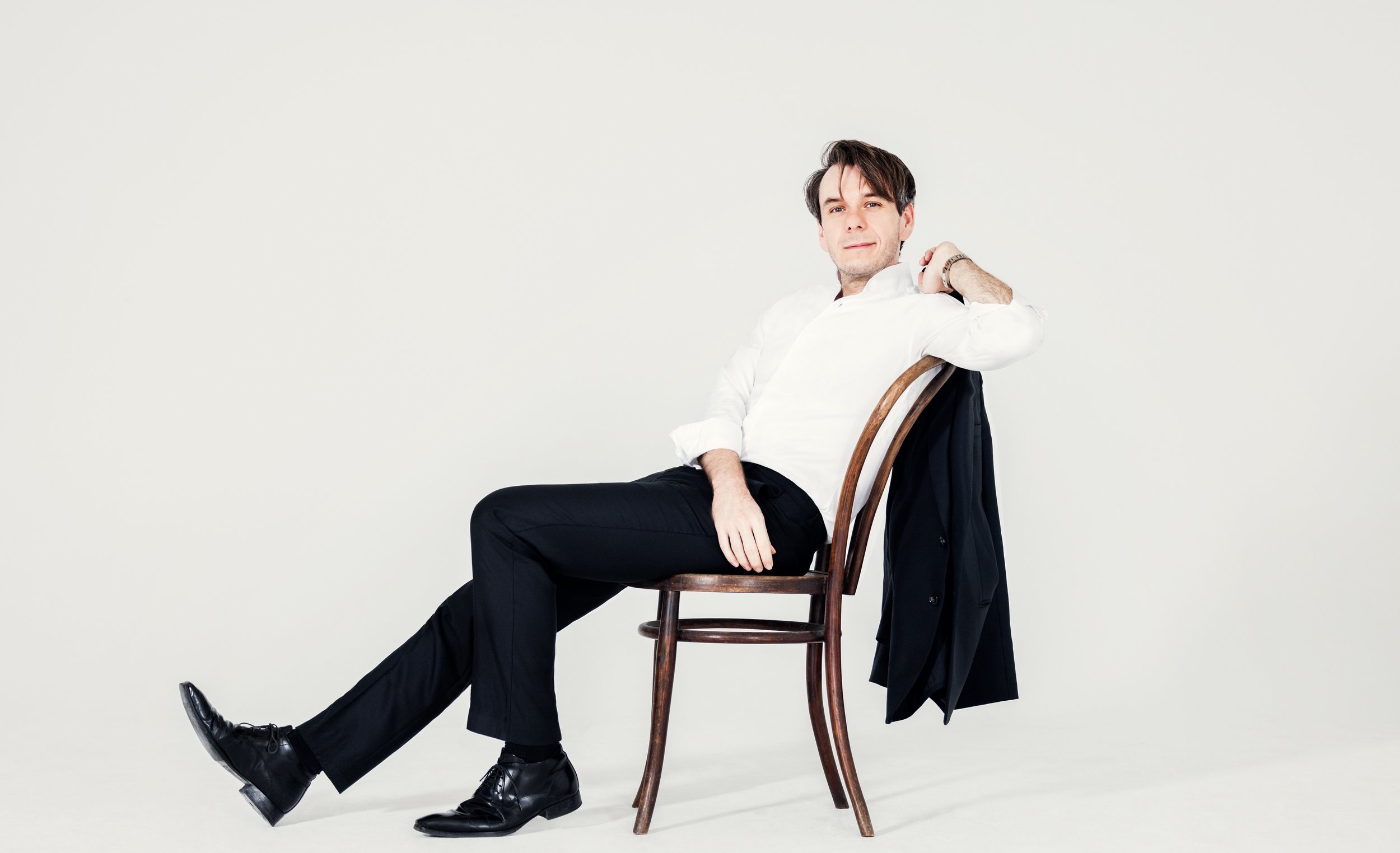
Recordings
DOUCE FRANCE
AUGUST 30, 2024
Read More
In April 2019, Bernheim signed a long-term exclusive contract with Deutsche Grammophon. Douce France is his third album for the yellow label.
“After delivering a spine-tingling performance at the Paris 2024 Olympic closing ceremony, French star tenor Benjamin Bernheim releases his first solo song album Douce France: Mélodies & Chansons. Inspired by his long study and experience of French song, Bernheim imaginatively couples the famous 19th-century melodies of Berlioz, Chausson and Duparc with the classic 20th-century chansons by Brel, Kosma and Trenet. While some of these cycles are nowadays associated with the female voice accompanied by orchestra, the tenor was determined to return to the deep intimacy that a keyboard accompaniment can conjure. Bernheim’s regular duo partner, pianist Carrie-Ann Matheson, transcribed the relevant orchestral scores into the more idiomatic versions for piano heard on this album. “
Boulevard des Italiens
April 8, 2022
Benjamin Bernheim’s second solo album for Deutsche Grammophon turns the spotlight on a century of Italian opera in Paris.
Read More
“The most beautiful tenor voice since Luciano Pavarotti.”
— Süddeutsche Zeitung
“With a French singer and conductor and an Italian orchestra we show how two worlds come together in style – Italian music and the French language!”
— Benjamin Bernheim
Documenting more than a hundred years of Italian operatic music in France, Benjamin Bernheim’s new album Boulevard des Italiens will be released on Deutsche Grammophon on 8 April 2022. Music stretching from Spontini’s La Vestale to Mascagni’s Amica – all sung in French – receives gold-star treatment from Bernheim, a tenor ideally placed to sing this repertoire in his native language. As he explains, “The aim was really to show the history of the French language in opera houses in Paris by way of these Italian composers who brought their pieces there. With the Opéra Garnier at one end, and the Opéra-Comique at the other, the Boulevard des Italiens is where it all happened.”
Throughout the nineteenth century and into the twentieth, Paris was the operatic capital of Europe. From Cherubini to Mascagni, Italian composers in particular were drawn to the city with its cosmopolitan outlook and opera-loving audiences. This resulted in an exciting and productive mutual exchange between the French and Italian theatrical traditions. Almost without exception, works were staged in French, whatever their country of origin, and in adapting their music to work with the sonorities of the French language, Italian composers rose to new levels of melodic creativity.
On Boulevard des Italiens, Bernheim performs a representative selection of their operatic calling cards, having turned to the Venice-based Palazzetto Bru Zane – Centre de musique romantique française for advice on repertoire. As he explains, in addition to giving inspired ideas and suggestions, the organisation also “helped us enormously, doing amazing work on editing not just the vocal scores, but the orchestral ones as well”.
It was Spontini who ushered in the new era of Romantic opera in Paris, with his groundbreaking La Vestale of 1807 – a gripping, passionate scene from this work provides the earliest music on Boulevard des Italiens. Bernheim also performs music by Spontini’s near contemporary Cherubini, with an aria taken from the little-known Ali Baba (1833) and notable for its use of the high Cs which by this time every tenor had to have as part of his vocal armoury.
From the early 1800s onwards, the roster of visiting Italian composers grew. One of the most successful among their ranks was Donizetti. Bernheim has chosen excerpts from three of the operas the composer premiered in the French capital, including the less frequently performed Dom Sébastien, his final work in the genre, as well as the ever popular La Fille du régiment and La Favorite.
When it comes to the towering figure of Verdi, Bernheim has even bigger surprises in store. It is a revelation to hear the lilting tenor aria from Jérusalem, the composer’s French version of I lombardi – “transformed beyond all recognition”, as Verdi put it – as well as a genuine rarity, an aria for the tenor hero in his epic Les Vêpres siciliennes. This number was written not for the first performance but as a replacement aria in a later revival, and tucked away as an appendix in one early edition of the score. Verdi’s Don Carlos is, as Bernheim says, “a central piece for me”. For this album he selected the hero’s beautiful opening aria and the famous stirring duet for tenor and baritone in its longer, more nuanced original French version, featuring a guest appearance from baritone Florian Sempey.
The connections between Puccini and Paris are many and deep, not least for the version of Madama Butterfly premiered at the Opéra-Comique in 1906 which established the definitive score of the opera. Up until the 1960s it was customary to sing Puccini in French. In reviving this tradition with two well-known arias from Madama Butterfly and Tosca, Bernheim gives an ideal demonstration of the way that “the French language, with its different accents and more nasal vowels, brings a new sonority to this music”.
Completing the historical overview, an extended scene from Mascagni’s rarely-given Amica, written to a French libretto and first performed in Monte Carlo in 1905, allows Bernheim to revel in the sound of French combined with Italian verismo at its most heartfelt.
The recording sessions with conductor Frédéric Chaslin and the Orchestra del Teatro Comunale di Bologna took place in April 2021 – “just as the world was opening up again”, recalls Bernheim. “It was a wonderful feeling, both personally and musically,” he adds. “We were literally immersed in Italian sonorities.”
Benjamin Bernheim has received widespread acclaim for both his stage performances and his 2019 debut album on Deutsche Grammophon, for whom he records exclusively. On Boulevard des Italiens, the singer hailed by Diapason as “the new star tenor” not only gives an object lesson in French operatic singing, with diction praised for its “miraculous clarity”, but provides a fascinating survey of the symbiotic relationship between Paris and generations of Italian composers.
Debut
November 8, 2019
With his mature musicianship, powerful stage presence and engaging, approachable persona, French tenor Benjamin Bernheim stands out from the operatic crowd.
Read More
In April 2019, he signed a long-term exclusive contract with Deutsche Grammophon. His debut album for the yellow label showcases the breadth and depth of his exceptional talent in a wide-ranging selection of tenor arias.
“Working in partnership with Deutsche Grammophon, a label with such a long and illustrious history, is both an enormous honour and a huge responsibility,” says Bernheim, for whom the world’s most prestigious opera houses are already homes from home. “It’s given me an even greater incentive to perform at the very highest level.” Born in Paris in 1985, Bernheim studied in Lausanne then became a member of Zurich Opera’s renowned International Opera Studio. Before long he was one of the most sought-after lyric tenors worldwide, and he is now regularly invited to appear at La Scala, Milan, the Berlin Staatsoper, the Royal Opera House, Covent Garden, the Vienna Staatsoper and the Salzburg Festival, among many others. Wherever he goes, he captivates audiences with his mesmerising vocal and dramatic interpretations.
Accompanied by the Prague Philharmonia under the baton of Emmanuel Villaume, on his debut DG album Bernheim presents a varied programme drawn from the Italian, Russian and French operatic repertoire. His vocal and expressive versatility can be heard, for example, in Lensky’s aria from Tchaikovsky’s Eugene Onegin, an opera in which he enjoyed huge success at the Deutsche Oper in Berlin, and in Edgardo’s “Tombe degli avi miei” from Donizetti’s Lucia di Lammermoor. Another of the characters featured here is Puccini’s Rodolfo (La bohème), a role he sees as “steeped in tradition”, and therefore one for which he needed to find his own personal interpretation – “a challenging but hugely rewarding experience”. The music of his birthplace is particularly close to his heart, and is represented on the album by arias such as “En fermant les yeux” from Massenet’s Manon, “L’Amour! Oui, son ardeur” from Gounod’s Roméo et Juliette and “Salut! demeure chaste et pure” from the same composer’s Faust. “The French repertoire requires perfect diction and the ability to convey the meaning behind the text as well”, observes Bernheim. “There is so much poetry in these pieces and there are so many details to discover in them. My aim is to bring all of this out in my performances. These are works in which I can give 150% and use every different facet of my voice.”
Faust
August 30, 2019
The masterpiece of French opera – Gounod’s ‘Faust‘ – still has surprises in store for us. Originally conceived in the spirit of opéra-comique, the 1859 score alternated between spoken dialogue and music, intermingling witty comedy and Romantic pathos.
Read More
It is that ‘first Faust’ that the Palazzetto Bru Zane reveals in this recording, and particularly the many numbers that were subsequently deleted or altered. To restore the opera in its original colours, the Centre de musique romantique française has called on Christophe Rousset and his ensemble Les Talens Lyriques, who provide an unfamiliar aesthetic perspective on a work we all thought we knew well. This is also one of the firsts major recordings of the young tenor Benjamin Bernheim, who sings Faust, and who finds in Véronique Gens a partner with great experience in the music and text of this repertory.




